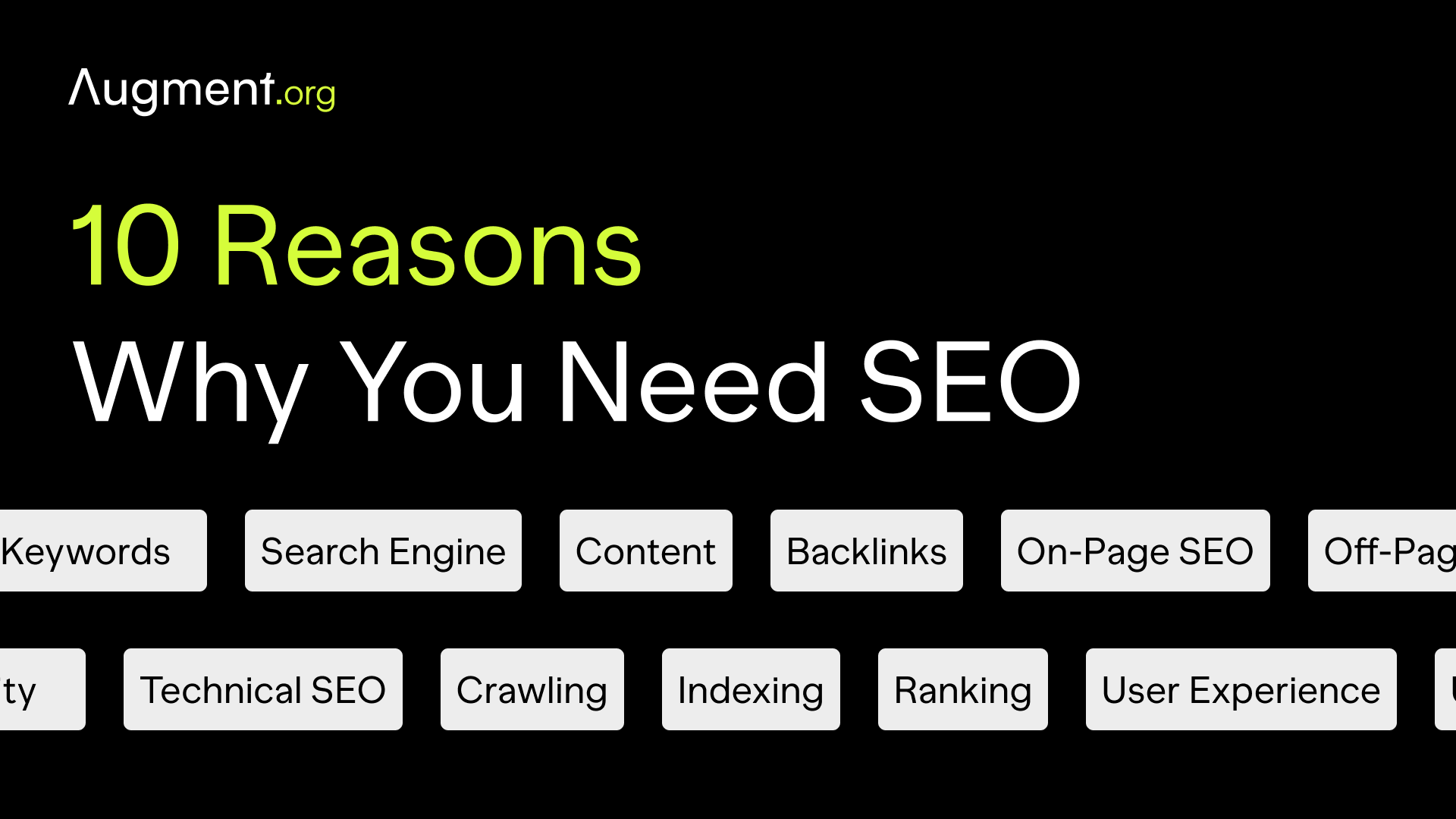Why SEO is Important for Business: 10 Reasons You Need SEO
Search engine optimization is the bedrock of your digital presence. It drives organic traffic to your website and solidifies your search engine rankings. Here's why SEO is critical for business success.

What is SEO?
Search Engine Optimization, or SEO, is a process designed to increase a website's visibility when people search for products or services related to that business in search engines. The goal is to enhance organic traffic—the kind of visitors who find your page through a free search rather than paid ads.
By optimizing your site, you align it more closely with the criteria used by search engines to rank web pages. This means tweaking various elements like the site's technical setup and the content itself so that search engines can understand and trust your site, presenting it as a top result to users. This is crucial because the higher your page appears in search results, the more likely it is to garner attention and attract prospective and existing customers to your business.
Basically, search engine optimization is making sure that when people are searching for something relevant to your business, that you can be found at a very high ranking on Google. This brings in organic traffic. It brings in the right organic traffic because it's people who are interested in what you have to offer. And so you have to take it very seriously.
— Jimmy Wales, Founder of Wikipedia
Paid vs Organic Search
When it comes to boosting your website's visibility, there are two main pathways: paid search and organic search.
- Paid search, often associated with pay-per-click (PPC) campaigns, involves purchasing advertising spots on search engine results pages (SERPs). These ads appear above or alongside the organic search results, with a clear label indicating their paid status. While they can drive immediate traffic, their visibility stops once the campaign ends.
- Organic search, on the other hand, relies on SEO efforts to naturally elevate your website's search engine rankings. It's about relevance and trust, ensuring your content aligns with what users are seeking. This not only improves the likelihood of appearing on the first page of search results but also attracts organic traffic—visitors who are more likely to engage with your site and potentially convert into customers. Unlike paid search, the benefits of successful SEO strategies can continue to impact your website traffic and online success long after initial efforts are made.
Key Elements of SEO
To ensure your website stands out in the competitive digital marketplace, it’s essential to understand and leverage the key elements of search engine optimization (SEO). These components work together to enhance your website’s search engine rankings and drive more organic traffic to your site.
Keywords
Keywords are the signposts that guide users to your content via search engines. They are the terms and phrases that prospects type into the search bar when looking for information, products, or services. These relevant keywords must be carefully researched and strategically implemented to match the search queries of your target audience.
The inclusion of target keywords in your content ensures that your web pages meet the specific needs of users, enhancing your visibility in search results. The process of keyword research typically involves analyzing search volume, keyword difficulty, and relevance to your products or services, ensuring you prioritize terms that have the potential to drive the most qualified traffic to your site.
Beyond just finding the right words, it’s about understanding the intent behind them. This means discerning whether a user is seeking information, looking to make a purchase, or simply browsing. By aligning your content with user intent, you maximize the effectiveness of your website's search engine optimization, leading to better search engine results and, ultimately, a more substantial impact on your digital marketing efforts.
Content
High-quality content is what attracts users to your site and keeps them engaged. An effective SEO Content strategy involves more than just writing articles or blog posts; it's about providing value through information that is relevant, informative, and solves problems for your audience. Content should be crafted with both the user and search engines in mind, utilizing those carefully chosen keywords while also ensuring readability and engagement. This encourages visitors to spend more time on your site, which search engines interpret as a positive signal.
Content must also be updated regularly to stay relevant. Search engines favor fresh, up-to-date content, which means regularly revisiting and revising your pages is necessary. This also includes expanding your content to cover new topics and trends in your industry, which can help establish your site as an authoritative source and a go-to destination for both current and potential customers seeking knowledge and resources.
Backlinks
Backlinks serve as endorsements from other websites, indicating that your content is valuable and credible. The quality of backlinks is crucial—links from reputable and relevant sites have a more significant impact on your SEO than those from low-quality sites. It's not just about quantity; a few high-quality backlinks can be more beneficial than numerous poor-quality ones. Building a network of backlinks takes time and effort, involving reaching out to other site owners, creating shareable content, and engaging within your industry’s online community.
The context of backlinks also plays a vital role in the value they provide. Links that naturally fit within the content and provide additional information or resources for readers are seen as more beneficial by search engines. It's also essential to have a diverse backlink profile that includes links from various sources, such as blogs, directories, and news sites, to signal broad endorsement of your site's content.
On-Page SEO
On-page SEO is the practice of optimizing individual web pages to rank higher and earn more relevant traffic. It includes optimizing your content as well as the HTML source code, like meta tags and image alt text. These elements help search engines understand the context and content of your pages, making it easier for them to index and present your site to searchers. It also involves ensuring that your site is structured in a way that search engines can navigate and users find intuitive, which includes a clear hierarchy, proper use of header tags, and a comprehensive internal linking structure.
Another critical aspect of on-page SEO is site performance, including load times and mobile responsiveness. Search engines, particularly Google, prioritize sites that provide a fast and smooth user experience. Site speed is not just about keeping search engines happy; it's also about the user. Slow load times can increase bounce rates as users tend to abandon pages that don't load quickly, which can negatively impact your search engine rankings.
Off-Page SEO
Off-page SEO refers to actions taken outside of your own website to impact your rankings within search engine results pages. This includes efforts like social media marketing, guest blogging, and influencer marketing. While these don't directly affect your site's content or structure, they can drive traffic and enhance your site's perceived authority. When done correctly, off-page SEO can create a buzz around your brand and signal to search engines that your site is an important resource for users.
Creating valuable content that others want to link to is the cornerstone of off-page SEO. It’s also beneficial to engage with your community through forums, social media, and commenting on other blogs. This interaction can lead to natural link building and sharing, which reinforces the credibility and authority of your website. Remember, it's about quality over quantity, and genuine engagement over superficial tactics.
Technical SEO
Technical SEO refers to optimizing the technical aspects of your website to help search engine spiders crawl and index your site more effectively. This includes aspects like structured data, proper use of tags, and improving crawl efficiency.
Ensuring your website's technical health means that search engines can easily understand and index the content, which is foundational to achieving good rankings. A technically sound website also provides a better user experience, which can lead to increased engagement and time on site, further signaling to search engines the quality and relevance of your site.
Technical SEO also involves optimizing for site speed, ensuring security with HTTPS, and implementing responsive design for mobile users. It also means fixing broken links and errors that could potentially harm your site's usability and search engine rankings. Keeping up with the technical side of SEO requires regular audits and updates, as search engines continuously evolve their algorithms and standards for ranking web pages.
How SEO Works
SEO works as a multifaceted approach to improve a website’s visibility and ranking on search engine results pages. It involves optimizing various elements of your website so that search engines can easily understand and present your content to users who are looking for related information, products, or services.
- Crawling and Indexing:
- Search engines use bots to move from website to website, gathering information about each page and indexing it.
- Think of the index as a big library and the search engines as librarians that pull out the best book to answer your question.
- Analyzing and Ranking:
- The search engines analyze indexed pages, looking at hundreds of factors to decide which pages should show up first in the search results.
- Factors include keywords, the quality and helpfulness of content, how fast pages load, and backlinks.
- Keywords:
- Keywords help the search engines figure out if a page matches what someone is looking for.
- Keyword research helps to find which words people use when they search for things online. This helps your page show up in the right search results.
- SEO Factors:
- Search engines look for good content, if people like the website (user engagement), if the website is fast (page speed), and if other sites think the website is good (backlinks).
- These things help search engines trust your site and show it to more people.
- Ongoing Optimization:
- Using tools like Google Analytics, SEO teams watch how many visitors come to the site and what they do there.
- This information helps the team keep making the site better so it keeps showing up in search results.
- Continuous Improvement:
- SEO work never really stops because search engines keep changing how they decide which pages are the best.
- Staying on top of these changes through strong team alignment is important to keep your website traffic up and maybe even boost online sales.
- Why SEO is Important:
- Good SEO helps a website speak the search engines' language, making it more likely for the website to meet internet users who are looking for what the business offers.
- It's a key part of digital marketing because being found on search engines can lead to more visitors and sales, which is super important for business.
The Main Goals of SEO in Digital Marketing
In the realm of digital marketing, SEO stands as a central pillar, vital for achieving a variety of business and marketing goals. Here's a closer look at what those objectives typically include:
- Increasing Organic Search Traffic: The primary aim of SEO is to enhance organic search engine results, attracting more visitors without the need for paid advertising. By optimizing for relevant keywords and creating content that matches user intent, a business can significantly increase the volume of users who find their site through search engines.
- Improving Quality of Traffic: SEO isn't just about quantity; it’s about quality too. The goal is to attract prospective customers who are genuinely interested in what the business has to offer. This involves keyword analysis and crafting content that targets those who are most likely to convert into customers.
- Boosting Online Visibility and Brand Awareness: A good SEO strategy can elevate a brand's presence in search results for related queries. This is particularly important for local SEO, where businesses seek to be more visible in the geographical areas they serve.
- Establishing Authority and Trust: Ranking higher in search engine results pages is a signal of authority. SEO efforts aim to make a website a trusted resource for users, which search engines reward with higher rankings.
- Enhancing User Experience: SEO involves improving the technical aspects of a website like site speed, mobile-friendliness, and easy navigation, which are crucial for keeping visitors engaged and reducing bounce rates.
- Supporting Content Marketing: Through SEO, businesses can ensure that their valuable, helpful content reaches the right audience. This not only assists in building a relationship with users but also in cementing the brand's position as an industry leader.
- Driving Long-Term Results: Unlike paid ads, the benefits of a successful SEO strategy can have long-term effects on business online. It's a cost-effective approach to maintain a digital presence and drive online sales over time.
- Measuring Success: With tools like Google Analytics, SEO provides measurable results. Businesses can track how many visitors their SEO efforts bring in, what actions they take on the site, and how their organic rankings improve over time.
Each of these goals contributes to the overarching aim of SEO within digital marketing: to connect businesses with their target audience online, ultimately leading to increased engagement, better conversion rates, and a stronger bottom line.
10 Reasons Your Business Needs an SEO Strategy
Every business with an online presence can reap significant benefits from implementing a strong, strategic SEO plan. Here are 10 reasons why your business should consider investing in its SEO strategy:
- To Increase Web Visibility: SEO makes your website more visible on search engines. If people can’t find you online, they can’t do business with you. SEO puts you in the digital spotlight.
- To Target Quality Traffic: SEO helps you attract the right kind of traffic. With keyword research, you focus on people who are looking for what you offer, which can lead to more conversions.
- For Higher Return on Investment: Compared to paid ads, SEO is cost-effective and offers a higher return over time. Once your SEO strategy takes off, it requires less maintenance than paid advertising.
- To Build Credibility and Trust: A well-optimized website appears trustworthy to visitors. SEO helps build your brand’s authority and credibility, which is important for business growth.
- To Improve User Experience: A good SEO strategy improves your website's user experience. A site that's easy to navigate keeps people around longer, which can help with your search engine rankings.
- To Stay Competitive: Chances are, your competitors are already doing SEO. To keep up or get ahead, you need an SEO strategy that helps you stand out in your industry.
- To Adapt to Search Engine Updates: Search engines frequently update their algorithms. A solid SEO plan helps you adapt to these changes and maintain or improve your visibility.
- To Enhance Local Engagement: Local SEO helps people in your area find your business. This is key if you rely on local customers for your sales.
- For Sustainable Growth: SEO is a long-term strategy. It helps you steadily increase your online presence and grow your business over time.
- For Measurable Success: With SEO, you can measure virtually every aspect of your results. SEO data and metrics, like search volume and traffic, tell you exactly how well your efforts are working.
Having a robust SEO strategy is an integral part of your overall marketing strategy and, when executed well, leads to better search engine results pages rankings, increased traffic, and more potential for online sales. It's not just about getting to the top of the results page; it's about staying there and turning visibility into tangible success.
How to Create an SEO Strategy
Creating an SEO strategy can seem daunting, but breaking it down into key steps can simplify the process. Here’s how to get started:
- Set Your Goals: Decide what you want your SEO to achieve. Is it more website traffic, higher rankings on search engine results pages, more online sales, or all of the above? Your goals will guide your SEO strategy.
- Understand Your Audience: Know who your customers are and what they’re searching for. Use keyword research to find the terms and monthly search volumes that match your target market’s interests.
- Analyze Your Current Website Setup: Review your current site's SEO. Look at the structure, content, and current rankings. This will help you see what's working and what needs improvement.
- Optimize for Keywords: Choose keywords that are relevant to your business and have a good search volume. Be careful to avoid keyword stuffing; instead, use keywords naturally in your content.
- Create Quality Content: Develop content that’s informative, helpful, and engaging. Quality content is a key part of SEO success and a critical component of keeping visitors on your page.
- Build Backlinks: Reach out to other websites to link back to your site. Backlinks from reputable sites can improve your SEO by showing search engines that your site is valuable.
- Optimize for Local Search: If you have a physical location or serve specific areas, use local keywords and listings to show up in local search results.
- Stay Updated on SEO Practices: Search engine algorithms change frequently. Keep your strategy flexible and stay informed about the latest SEO practices.
- Measure Your Success: Use tools like Google Analytics to track your results. Look at your traffic, where it’s coming from, and what people do once they’re on your site.
- Adjust as Needed: SEO isn't a one-time task. Regularly review your results and adjust your strategy to keep improving your search engine rankings and meeting your business goals.
SEO is about more than just being seen—it’s about being found by the right people, engaging them with quality content, and converting that engagement into business success. With the right approach, your SEO efforts can make a significant impact on your overall digital marketing strategy.



